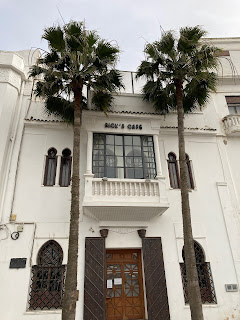One of my all-time favorite movies is “Casablanca,” considered by many to be the best film ever made. So, when our temple planned a Jewish heritage tour to Casablanca and Morocco, I eagerly jumped aboard. So did Gilda (though she is not as big a fan of the 1942 film). Another 33 intrepid travelers to the casbah and beyond joined our mid to late February adventure.
Let’s dispose of several myths. First, a casbah or kasbah, is not a romantic hideaway in an Arabian town, a common misperception based on a line of dialogue (“Come with me to the Casbah”) that has become part of folklore but was never said by Charles Boyer to Hedy Lamarr in the 1938 movie “Algiers.”
A casbah is a fortress inside a walled enclosure where a ruler resided, much like a keep in European castles. It is not a warren of dark, crowded alleys where merchants hawk goods of varying quality and families live above the mercantile fray. Those are commonly known as souks; in Morocco they are called Medinas.
Second, Rick’s Cafe in “Casablanca” was a figment of Hollywood imagination, though an enterprising entrepreneur opened a movie-inspired Rick’s Cafe restaurant and bar in Casablanca in 2004, even featuring a singing pianist named Esam, the closest name to Sam the owner could find. Like moviedom’s Captain Louis Renault, authorities would be “shocked, shocked” to find there was gambling inside the modern Rick’s Cafe, though local Muslims rounded up as usual suspects could escape punishment by claiming to be Jewish Moroccans, Jews being excluded from Islam’s prohibition on gambling.
In 1950, some 300,000 Jews lived among Morocco’s near 10 million population. But waves of emigration, mostly to Israel after its founding in 1948 and after wars in 1956, 1967, and 1973, left only a remnant of Jews, perhaps a trifle more than 2,000, in Morocco while the general population grew to near 38 million. Casablanca is home to the largest contingent of Moroccan Jews.
The film’s background story of desperate Europeans converging on Casablanca to obtain travel visas to Lisbon and beyond to escape the Nazis was pure fiction, as well.
The hub of escape intrigue was Tangier, not Casablanca. As our tour guide Mokhtar explained, the background story of Casablanca could not have happened there. Victor Laszlo could not have gotten out as German troops, not the Vichy, controlled the city.
Life in Tangier, on the other hand, was similar to what was depicted in the movie. Situated at the southern tip of the Straits of Gibraltar, Tangier was declared an international zone because neither the Allies nor Axis adversaries wanted to cut off transit into and out of the Mediterranean Sea. Refugees flocked there to secure passage to freedom.
To Hollywood, Casablanca became a more salable name for a film. The 1946 Marx Brothers caper “A Night in Casablanca” capitalized on the city’s fame, while Bing Crosby and Bob Hope chimed in with “The Road to Morocco,” also in 1942.
Mokhtar, our licensed guide of inestimable knowledge of Moroccan history and culture, fluent in several languages, with a quick wit, darting eyes and expressive smile that tolerated even the most mundane tourist inquiries, explained that Casablanca means “white house,” a reference to the white buildings throughout the city. Cities along Morocco’s long coastline have many white buildings as white keeps facades from being degraded by sunshine.
Casa, as the city is called by locals, has become the commercial, cultural and financial center of Morocco. It also has the second largest mosque in the Islamic world, exceeded only by that in Mecca. And it is home to seven functioning synagogues, though it is difficult for each of them to muster the required minyan of 10 adult males for congregational services.
The focus of American Jews on their heritage has mainly been to central and eastern Europe, first on the migration of their ancestors in the late 19th and early 20th centuries, then, sadly, to the tragic annihilation by Nazi Germany and its henchmen of families members left behind.
Yet Jews have lived in Morocco for more than 2,000 years, arriving some 600 years before Mohammed’s disciples spread the teachings of Islam. Morocco has sheltered numerous prominent Jewish scholars including Maimonides. It hasn’t always been a bed of roses but recent history with the kings of Morocco have been among the most positive of their time in Morocco.
During World War II, Morocco came under French Vichy control. When the Nazi-aligned government sought to identify Jewish Moroccans for eventual transport to death camps in Europe, King Mohammed V refused. His successors have maintained unofficial but extensive relations with Israel.
Israelis from Arab countries, for example, cannot go back to their homelands, but Moroccan Jews in Israel can return to walk in the neighborhoods of their youth or visit cemeteries where their ancestors are buried, gravesites maintained with the assistance of the Moroccan government.
(Editor’s Note: This is the first in a series of blogs on Morocco and its Jewish heritage.)


